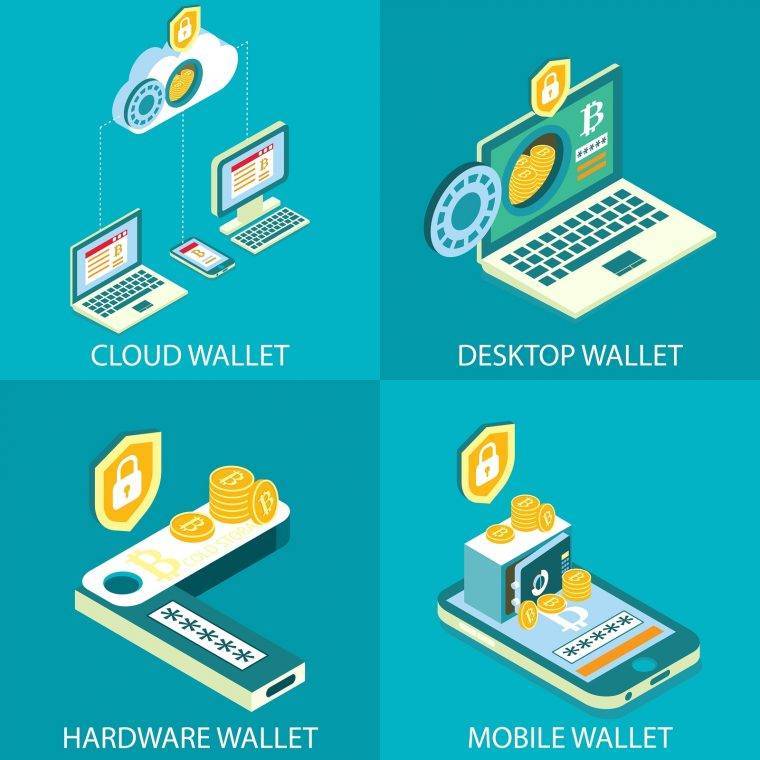Cryptocurrency wallets are an integral part of using Bitcoin and other cryptocurrencies, serving as a fundamental component of the infrastructure that enables sending and receiving funds via blockchain networks. Each type of wallet has its advantages and disadvantages; therefore, it is essential to understand how they work before using them to store your digital currencies. Below is a comparison of different types of cryptocurrency wallets used for storing digital currencies, and which one might be suitable for you. Note that your choice of wallet may vary depending on the amount of cryptocurrency you have at your disposal.
#### First: What is a Cryptocurrency Wallet?
A cryptocurrency wallet is a tool you can use to interact with the blockchain network. There are many types of cryptocurrency wallets that can be categorized into three groups: Software Wallets, Hardware Wallets, and Paper Wallets. Depending on their operational mechanisms, they may also be referred to as Hot Wallets or Cold Wallets. The majority of investors rely on Software Wallets, making them more convenient than Hardware Wallets. However, hardware wallets tend to be the more secure alternative. On the other hand, paper wallets consist of a printed wallet on a piece of paper, but their use is now considered outdated and unreliable.
These wallets can also be classified as Hot or Cold depending on how they operate. Hot wallets are any wallets connected in some way to the internet, while Cold wallets are not connected to the internet; instead, they use a physical medium to store keys offline, making them resistant to online hacking attempts.
#### Second: How Do These Wallets Work?
Contrary to popular belief, these wallets do not actually store cryptocurrencies. Instead, they provide the necessary tools to interact with the blockchain network. In other words, these wallets can generate the information needed to send and receive cryptocurrencies via blockchain transactions. This information often consists of one or more pairs of public and private keys.
The wallet also includes an address, which is an alphanumeric identifier generated based on the public and private keys. This address essentially is a specific location on the blockchain network where currencies can be sent. This means you can share your address with others to receive funds, but you should never disclose your private key to anyone.
#### Third: What Are the Types of Cryptocurrency Wallets?
1. **Software Wallets:**
Software wallets come in many different types, each with its unique features. Most of them are connected to the internet and thus fall under the category of hot wallets. The most common and important ones are:
- **Web Wallets:** These allow investors to access their wallets online via internet-connected devices such as computers, smartphones, tablets, desktops, and phones.
- **Desktop Wallets:** Considered a secure alternative for storing cryptocurrencies, these are programs you can download on your computer, giving you full control over the wallet. Desktop wallets act as an address for users to send and receive cryptocurrencies and also allow users to store and manage their private keys, reducing the risk of hacking.
- **Mobile Wallets:** Operating similarly to desktop wallets but designed specifically as applications for smartphones, mobile wallets are very convenient as they enable you to send and receive cryptocurrencies using QR codes. Hence, mobile wallets are particularly suitable for everyday transactions and payments, making them a viable option for spending Bitcoin and other cryptocurrencies in the real world. However, just like computers, smartphones are vulnerable to malware and viruses, so it’s advisable to encrypt your mobile wallet with a password and back up private keys or the seed phrase in case your smartphone is lost or malfunctions.
2. **Hardware Wallets:**
These are devices specifically designed to store digital keys and fall under the category of cold wallets. They provide the highest level of security since they are separate from the internet, thus making your digital currencies less susceptible to online attacks. However, this storage method can sometimes be difficult to use and access, so it is not recommended for short-term storage. Additionally, these devices can be expensive. However, in most cases, it may be worth it, especially if you are investing large amounts in cryptocurrencies.
So, which of these wallets is right for you?
You should consider using hardware wallets if you plan to hold your cryptocurrencies for a long time or if you are holding large amounts. Many of these wallets allow you to set up a personal PIN for protection, alongside a recovery phrase that can be used in case you forget the PIN.




